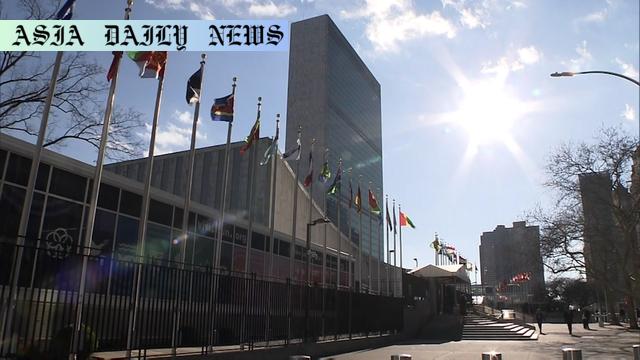United Nations expresses concern over President Trump’s statements on reclaiming the Panama Canal, emphasizing global sovereignty.
- UN expresses concerns over Trump’s remarks on the Panama Canal during his inaugural address.
- Panama’s President rejects Trump’s claims, reaffirming national control over the canal.
- UN emphasizes respect for sovereignty and territorial integrity as per the Charter.
- The issue underscores historical tensions related to US involvement with the Panama Canal.

Introduction
The United Nations has officially expressed its disapproval regarding statements made by US President Donald Trump during his inaugural address. Trump controversially stated that the United States intends to reclaim the Panama Canal, sparking international concern and criticism. The canal, a critical waterway, holds historic significance and remains under Panama’s sovereign control. The remarks not only raised questions but also reignited historical disputes over the United States’ previous involvement with the canal.
UN’s Emphasis on Sovereignty
The United Nations wasted no time in responding to Trump’s claims. In alignment with the UN Charter, Deputy Spokesman Farhan Haq highlighted the importance of respecting the sovereignty and territorial integrity of member states. These foundational principles are key to maintaining peaceful international relations. Haq reiterated that statements challenging such principles could have far-reaching implications, not just for Panama but for global diplomatic stability.
Panama’s Strong Rebuttal
Panama’s President Jose Raul Mulino firmly rejected Trump’s remarks. In a statement, Mulino emphasized that Panama fully administers the canal without interference from other countries, including China, as alleged by Trump. Addressing these misstatements, the Panamanian leader’s stance was a clear declaration that the canal’s sovereign control remains non-negotiable. His remarks also sought to reassure Panama’s citizens and the world of the nation’s autonomy over such key infrastructure.
UN’s Official Communication
The response to Trump’s remarks extended beyond verbal denouncements. Panama’s UN ambassador officially communicated with UN Secretary-General Antonio Guterres to address the perceived threat expressed in Trump’s speech. The ambassador referenced the UN Charter’s provision that all nations should conduct international relations without threats or coercive tactics that undermine another nation’s independence or territorial integrity.
The Historical Context of the Panama Canal
The Panama Canal, a monumental engineering feat, was initially constructed by the United States in the early 20th century to facilitate marine trade between the Atlantic and Pacific Oceans. However, after decades of US control, ownership was formally handed over to Panama on December 31, 1999, under the terms of the Torrijos-Carter Treaties. These treaties symbolized a step toward correcting historical inequities and acknowledging Panama’s sovereignty. The canal now serves as a major economic driver for Panama and a vital artery for global trade. The suggestion of reclaiming such a historically contentious asset risks reopening old wounds and creating new tensions.
Reactions from International Diplomacy
Trump’s comments did not only draw a sharp rebuke from Panama and the United Nations but also prompted reactions from international diplomatic circles. Many countries view such remarks as destabilizing factors in an already complex geopolitical environment. Moreover, the insinuation that another country, particularly China, has operational control over the canal failed to present factual accuracy, thus undermining the rhetoric’s credibility among global leaders.
Conclusion
The controversy surrounding President Trump’s remarks on the Panama Canal has sparked a global debate that touches upon critical principles of international relations: sovereignty, neutrality, and geopolitical respect. While the Panama Canal remains a symbol of resilience and autonomy for Panama, these comments underscore the lingering influence of historical narratives. As international diplomacy strives to uphold mutual respect among nations, the United States would do well to align its actions and statements with the established frameworks of global cooperation.



Commentary
Revisiting Historical Sensitivities
The Panama Canal is more than just a waterway; it is a symbol of sovereignty and a reminder of the tumultuous history that shaped Panama’s modern identity. When President Trump suggested the possibility of reclaiming the canal, he reignited memories of a bygone era marked by US dominance. Such comments, whether made intentionally or offhandedly, fail to consider the diplomatic progress made over decades to rectify historical grievances.
The Importance of Thoughtful Leadership
In the global political arena, words carry significant weight. Leaders, particularly those of superpowers, must exercise caution in their rhetoric to avoid miscommunication or unintended provocation. Trump’s remarks, regardless of intent, risk not only straining US-Panama relations but also eroding trust with other nations who value sovereignty as a cornerstone of international diplomacy.
The Risk of Undermining Global Norms
The United Nations’ reaction to these remarks is a strong testament to the global commitment to uphold norms that protect sovereignty and territorial integrity. If powerful nations were to disregard these principles, it would set a dangerous precedent, jeopardizing the very framework of international relations. Panama’s rejection of Trump’s comments suggests that even smaller nations can assert their rights and demand respect on the global stage.
Looking Ahead
This incident underscores the necessity for dialogue and fact-based communication between nations. As the world becomes increasingly interconnected, historical legacies must be approached with sensitivity, and discussions about shared interests should be rooted in mutual respect. The Panama Canal stands as a symbol of the enduring significance of such cooperative efforts.